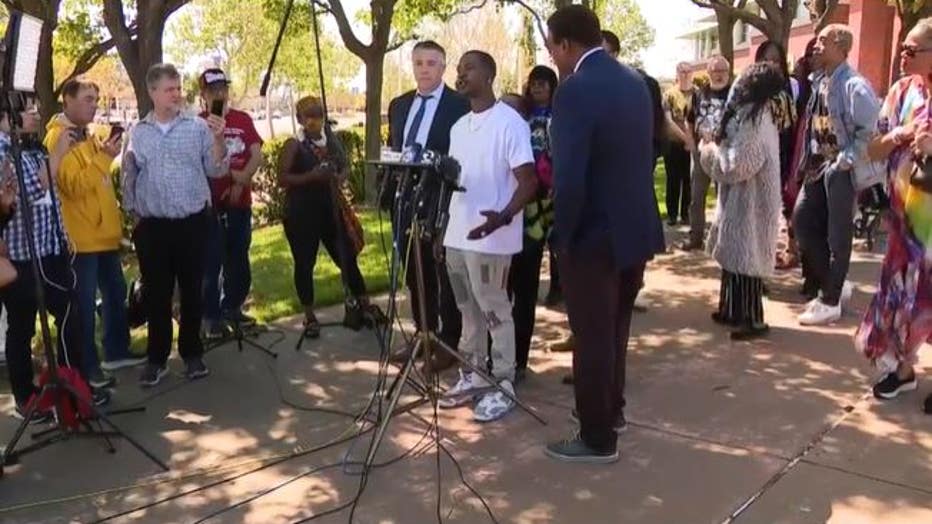Judge finds Contra Costa County DA overcharged Black defendants in watershed racial-bias ruling

Judge rules racial bias in Contra Costa County
In an unprecedented ruling, a Contra Costa County judge ruled that prosecutors have disproportionately charged Black defendants with sentencing enhancements that unfairly target them for life in prison without parole ? at about a 40% greater likelihood than non-Black defendants.
MARTINEZ, Calif. - In an unprecedented ruling, a Contra Costa County judge ruled that prosecutors have disproportionately charged Black defendants with sentencing enhancements that unfairly target them for life in prison without parole – at about a 40% greater likelihood than non-Black defendants.
Contra Costa County Superior Court Judge David Goldstein made his ruling formal on May 23.
And in doing so, he dismissed gang enhancements against four men under the 2022 California Racial Justice Act authored by Assemblyman Ash Kalra, (D-San Jose), which allows defendants to seek legal relief if racial bias can be proven.
It is the first ruling regarding racial bias in charging decisions in California.
The judge's order clears the way for any Black person who has faced or is facing those charges in Contra Costa County over the past decade to challenge them in court.
"It shows for the very first time in California that there is sufficient proof to show that there have been racial disparities in charging decisions," said Evan Kuluk, a deputy public defender with the Contra Contra Costa County Alternate Defender's Office who successfully brought the case to the judge on behalf of defendants Eric Windom, Terryonn Pugh, Keyshawn McGee and Allen Trent. "This is a watershed ruling."
Kuluk added: "We hope that this will be a model across the state for other defendants to be able to challenge their charges where they've been overcharged due to their race and can establish a historical pattern of that kind of charging. We also hope that this will lead to some changes in charging practices in the district attorney's offices across the state."
The four men are at the center of the racist Antioch police texting scandal.
Goldstein's ruling did not consider the texts in the racial-bias charging decision, but the judge did throw out the gang enhancements against the four. The murder, attempted murder and conspiracy charges were not changed. The four men are charged with killing a man to benefit an Oakland gang.
The East Bay Times first reported the judge's racial disparity ruling.
Kuluk brought the Racial Justice Act motion to the judge because he had "a hunch" that Black people were getting overcharged with the strictest of enhancements leading to life in prison without parole, known as LWOP, at a far greater rate than non-Black defendants.
"I had a lot of anecdotal experience that this has been happening with Black defendants," Kuluk said. "And it horrified me. I did everything I could to change what has been going on. LWOP should be saved for the worst of the worst. And that's not what has been occurring."
Through a public records request, Kuluk received homicide gang charging data from 2015 to 2022 involving 89 cases from Contra Costa County District Attorney Diana Becton, who is Black and describes herself as a progressive prosecutor.
Kuluk said that his peers are having a more difficult time getting this data from DAs in other parts of California and he credited Becton for being open with his office.

Adam Carpenter is suing the Antioch police department.
Armed with the data, Kuluk then hired a statistician to review the numbers.
He put UC Irvine Professor Richard McCleary on the stand to testify before the judge to prove his theory.
The findings: There is between a 32% to 44% greater likelihood of Black defendants being charged with special circumstances – like a gang enhancement – that could land them behind bars for life, which the judge called a "significant statistical disparity."
Supporters of special circumstance enhancements say the added charges are an important tool that allows them to hold gang members accountable. But critics argue gang enhancements yield arbitrary and excessive sentences, incarcerating Black and brown people at higher rates than white people who commit the same crimes.
Goldstein's pronouncement is the second Racial Act Justice ruling in Contra Costa County; the first was when a judge last year overturned two murder convictions finding that the prosecution had most likely injected racial bias into the trial against two Black men by quoting the men’s rap lyrics and repeating their use of a racial slur.
Kuluk was the defense attorney in that case, as well.
Meanwhile, in the county next door, newly elected Alameda County District Attorney Pamela Price, a Black woman and a progressive prosecutor, is reducing gang enhancements or not filing special circumstance charges against Black defendants on her own – without a judge's ruling – and getting a lot of heat for it.
After Goldstein's ruling in Contra Contra County, Price's former campaign spokesman Ryan LaLonde tweeted, "Yet when DA Price tries to stop in Alameda County… we get sky is falling reporting!"
For her part, Becton is committed to making the necessary changes in Contra Costa County to prevent more racially biased charging.
However, she was not ready to spell out specifically what her office would do in light of the judge's ruling, despite Kuluk's urging of creating a written, race-blind policy for the office of when to charge someone with the greatest enhancements.
She said she wanted time to review the order and come up with the best plan moving forward.
"It really is a landmark ruling," Becton told KTVU in an interview. "It is our first clear interpretation of the Racial Justice Act that examined the discrimination and sought to remedy bias or animus in the criminal justice system."
She said it's now incumbent upon her and other elected leaders to respond to "calls for reform to the law."
As a district attorney, she said she has to ensure that she has adequate resources and policies in place to give "clear direction" to her prosecutors on how to charge cases and "report outcomes in a transparent way to the public that we serve."
Becton did not want to dwell on the fact that some of the charging decisions came during her tenure as a Black prosecutor, adding: "A better question for me is whether or not we have recognized the disparities and continue to revise our policies to be responsive to what the data is telling us."
Both Kuluk and Becton hope that the ruling in Contra Costa County will be a model for other DAs around the state, and the country.
"Even though California is a pioneer in this area of the Racial Justice Act, it really is a piece of legislation that seeks to make our criminal justice system more fair and equitable for everyone," Becton said. "How can we correct those old policies of the past that might be leading to the disparities in our criminal justice system as we go forward?"
Lisa Fernandez is a reporter for KTVU. Email Lisa at lisa.fernandez@fox.com or call her at 510-874-0139. Or follow her on Twitter @ljfernandez

